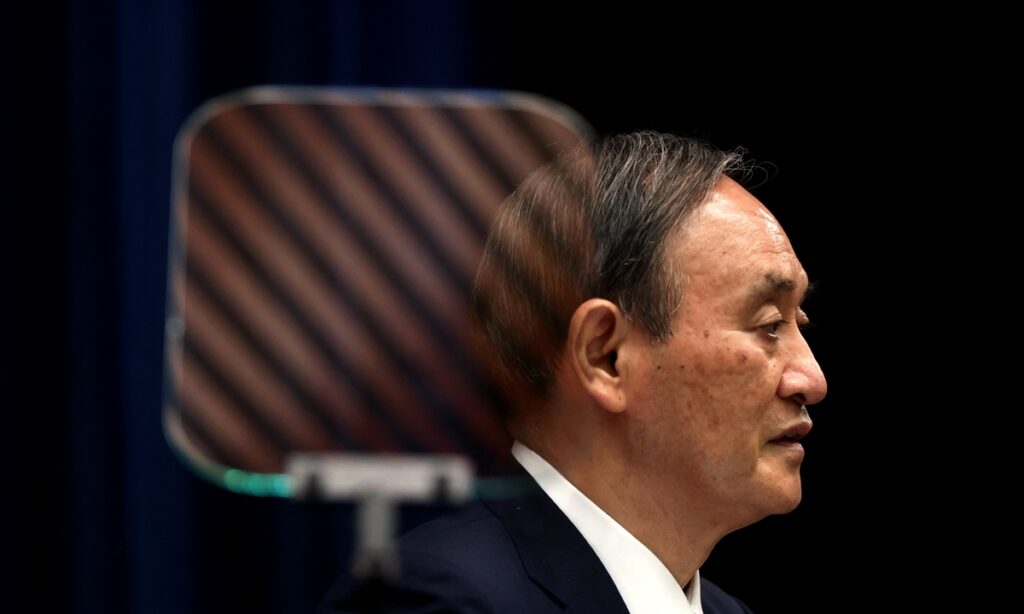A crucial presidential race has started within the Liberal Democratic Party (LDP) of Japan, after the LDP’s current leader Yoshihide Suga, also the incumbent Japanese prime minister, announced he was dropping out of the leadership vote later this month with some ambitious candidates eager to play the “China card” to gain votes.
Dealing with China would be a top priority in his government, Fumio Kishida, 64, a contender to succeed Suga, was quoted as saying by Nikkei Asia in a report on Saturday, expressing “deep alarm” at China’s “aggressive behavior” on the diplomatic and economic fronts.
Kishida also cited the island of Taiwan as the next big problem in “the standoff between the US and China.”
Kishida is one of the Japanese politicians to declare his candidacy for the LDP leadership vote set for September 29, after Suga on Friday said he would not run in the upcoming vote, stressing he wants to concentrate on fighting the COVID-19 epidemic.
Another candidate, Sanae Takaichi, an Abe disciple and former internal affairs minister, has also reportedly said she would introduce policies to fend off China’s technology threat to help strengthen the economy.
However, despite having foreseen intensifying attacks from Japan on China before a new cabinet is established, Chinese experts said that in the long run, Japan would not dare to actually take actions against China no matter who takes office, as Japanese politicians are clear that such actions would only lead them to become cannon-fodder for the US to contain China, as they know that the People’s Liberation Army is totally capable of defeating Japan’s self-defense forces.
On top of that, even the US would not dare to easily provoke China on issues concerning the island of Taiwan, experts noted.
“Politics in Japan has become more and more conservative, and public opinion on China has grown more and more negative,” Da Zhigang, director and research fellow of the Institute of Northeast Asian Studies at Heilongjiang Provincial Academy of Social Sciences, told the Global Times on Sunday.
Yang Bojiang, director-general of Institute of Japanese Studies of Chinese Academy of Social Sciences, echoed Da’s view, saying that “we can anticipate more attacks from the candidates on China before a new cabinet is set up as it is politically correct to attack China when Japan is facing external pressure from the US as well as domestic problems.”
Against the backdrop of the intensifying standoff between China and the US, there is little hope in seeing much moderation in China-Japanese relations with the arrival of a new prime minister. But that does not necessarily mean the new prime minister will continue the tough attitude or actually take actions after taking office, despite the fierce attacks during the election campaign to win votes, Da said.
Abandoned chess piece
Usually, the winner of the LDP leadership election becomes Japan’s prime minister, as the LDP holds a parliamentary majority.
Suga’s withdrawal means that he will quit as Japanese prime minister just one year after taking over from Shinzo Abe last September, who resigned citing ill health, Nikkei Asia reported.
The decision is a helpless attempt by Suga to exit safely amid slumping cabinet approval ratings, which have declined to 34 percent, according to a latest poll conducted by Nikkei, experts said.
Suga says he has been trying his best in the past year to combat the epidemic situation at home and to revive the economy, but the results have not been as satisfying as he expected, while the reasons for his failure are complicated. Suga has spared no efforts in seeking a balance between epidemic control measures and economic resumption, but Japan’s local self-government system and limited medical resources prevented him from promoting measures smoothly, Yang said.
He also made another mistake in blindly following the West’s words in believing in the idea of “coexisting with the virus,” Yang noted.
Despite Japan had managed to host the Tokyo Olympic Games under the pressure of the severe COVID-19 pandemic, some experts said that it was always inevitable for Suga to step down, as he was just a chess piece used by the LDP to maintain internal balance during the transition period following Abe’s resignation.
Kishida seems to be the strongest contender in the election race, but no matter who wins, the LDP is showing that it is still the strongest voice in the Japanese politics, observers pointed out.
While the coronavirus has swept through Japan, meaningless internal power struggles could lead to growing disappointment in the government among the Japanese public.
Rather than targeting China, the next Japanese cabinet should consider how to save itself from complaints and anxiety between the US and China as it is no longer the economic and technical giant it used to be, Chinese experts said, noting that the growing power struggle in the political field further reflects the country’s awkwardness.
China and Japan have maintained a lot of cooperation in trade. This is the essence of the bilateral relationship and will not be seriously damaged no matter who takes office after Suga, Yang said, noting that China is able to handle any challenge despite the Japanese administration’s continuing tough attitude.
But given the tendency of the two countries’ development, “China will become more powerful than Japan and Japan will certainly suffer more if bilateral ties worsen,” Yang said.
Japanese Prime Minister Yoshihide Suga Photo: AFP




